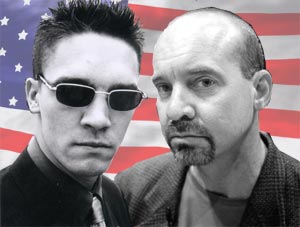|
|
 |
||||||
|
The truth was out there. Really out there.
|
|||||
|
Horns and Halos
by Ken Mondschein
|
||||||
|
Redemption is a funny thing. Drink a few cocktails, smoke a few doobies, snort a few lines of coke, make a few rotten business deals, and then embrace Christ as your savior, then Middle America will forgive you enough to elect you President. Do five years in prison for conspiracy to commit murder and, Eldridge Cleaver aside, your credibility is finished. That was conundrum that faced J.H. Hatfield in 1999, when St. Martin's Press pulled Fortunate Son, the biography of then-Texas governor George W. Bush in which Hatfield alleged Bush had been arrested in 1972 for cocaine possession, but had had his record expunged due to his family's political connections. Not only did Hatfield refuse to name his sources for the accusation, opening St. Martin's up to a possible libel suit and a backlash from a Bush White House, but, as it turned out, the author himself was a convicted felon. Whereas Hatfield may not have been The Smoking Gun, for conspiracy theorists, the obvious suggests itself: Could the Bush family, knowing that the story about the cocaine arrest would eventually come out, have leaked it to a hack writer with zero credibility in order to diffuse the situation before it broke in, say, the New York Times? Enter Sander Hicks, the founder of New York City independent press Soft Skull. With the righteous fury of John Brown at Harper's Ferry, he bought the rights to Fortunate Son and set about trying to make this bit of oddball journalism once again available to the American public. The documentary Horns and Halos is the story of the real-life relationship of Hatfield and Hicks, as it was captured by Suki Hawley and Michael Galinsky's video cameras, as they worked bring out the Soft Skull edition of Fortunate Son by the 2000 election, discredit George W. Bush, and, in so doing, perhaps begin to put back together the pieces of Hatfield's shattered life. That's only half the movie, though. The other half is watching Sander Hicks move across the screen like a tiger through the Indian jungle, or maybe like Daniel Striped Tiger through Mr. Rogers' back set. Horns and Halos was filmed when Soft Skull was based out of the Lower East Side and Sander still headed the company himself, so we have the pleasure of seeing the man in his natural environment. (Hicks is now working on a biography of Karl Rove, the Bush confidant who Hatfield finally revealed was his primary source on the cocaine allegations, and Soft Skull has moved to Brooklyn.) His angular, Calvin Klein model ectomorphic build, his punk rawk fashion sense, the working-class street cred his job as a building superintendent gives him combined with his intellectual prowess all come together like Voltron to make him the very first sex symbol of the twenty-first century radical Left. Girls, come to SEE Sander talk on the phone! THRILL as Sander angrily sweeps the stairs! SWOON as he performs with his punk band, White Collar Crime! J.H. Hatfield may have been a dupe, or he might have been delusional, or he might have been on to something. His credibility, to be sure, was never great. But that's not the lesson you take away from the movie. The lesson is that America needs would-be Jack the Giant Killers like Sander Hicks. In a world where news comes from media organizations that are owned by corporations that care only about the bottom line, where a story's entertainment value is valued more than what it says about our world, and where those with enough power and connections can suppress the truth about themselves, we need writers like Hatfield and publishing houses like Soft Skull. No matter how tragic the ending of Horns and Halos, and no matter how pessimistic its true-life drama may be about the possibility of redemption, we have to keep on rooting for the little guys. Click here to order Fortunate Son from Soft Skull Press.
Burning Bush? E-mail editor@corporatemofo.com
Posted March 3, 2003 3:14 AM
Backtalk
|
||||||
